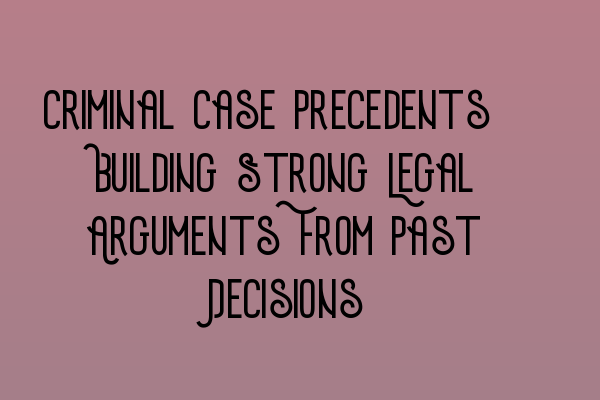Criminal Case Precedents: Building Strong Legal Arguments From Past Decisions
When it comes to successfully defending your clients in criminal cases, understanding and utilizing criminal case precedents can be a game-changer. Criminal case precedents refer to previous court decisions that serve as legal authority for future cases with similar facts or issues at hand. These precedents are established by higher courts and provide guidance for legal arguments.
As an experienced solicitor at SQE Criminal Law & Practice Law UK, I have witnessed firsthand the power of leveraging criminal case precedents to build strong legal arguments. In this blog post, I will discuss how you can effectively utilize past decisions to bolster your client’s defense strategy.
The Importance of Criminal Case Precedents
Criminal case precedents play a crucial role in the criminal justice system for several reasons:
- Legal Authority: Precedents are binding legal authority that judges must consider when deciding cases. By referencing and applying relevant precedents, you can strengthen your client’s legal position.
- Consistency: Precedents ensure consistency and predictability in legal outcomes. By referring to past decisions, you can anticipate how the court may rule in your client’s case.
- Persuasiveness: When presenting arguments based on well-established precedents, you increase your chances of persuading the court to rule in favor of your client. Precedents create a persuasive foundation for legal arguments.
How to Find and Analyze Criminal Case Precedents
Now that we understand the importance of criminal case precedents, let’s explore how you can effectively find and analyze them:
- Legal Research: Begin by conducting comprehensive legal research using reputable legal databases, such as Westlaw or LexisNexis. These platforms allow you to search for relevant cases based on keywords, jurisdiction, or legal issues.
- Keyword Search: To narrow down your search, utilize specific keywords related to your client’s case. For example, if your client is facing drug possession charges, you might search for “drug possession case precedents” or “drug possession court decisions.”
- Case Analysis: Once you have identified relevant precedents, carefully analyze them to determine their applicability to your client’s case. Pay attention to similar factual circumstances, legal issues, and the jurisdiction where the precedent was established.
- Distinguishing or Overruling Precedents: It is imperative to consider if any newer precedents have distinguished or overruled the ones you found. Always ensure you are referencing the most current and applicable precedents to strengthen your arguments.
Building Strong Legal Arguments Using Precedents
Now that you have found and analyzed relevant criminal case precedents, it’s time to build strong legal arguments for your client:
- Analogical Reasoning: Use precedents with similar factual circumstances to your client’s case as the basis for your legal arguments. Show how the court’s decision in the precedent should apply to your client’s situation.
- Differentiate from Distinguishing Precedents: If the opposing party tries to distinguish your precedent by highlighting factual differences, strategically counter by emphasizing the underlying legal principles that remain the same.
- Policy Arguments: Discuss the policy reasons behind the precedent and explain how these reasons align with your client’s position. Policy arguments can add further weight to your legal arguments.
- Address Contrary Precedents: If there are any contradictory precedents, acknowledge them but explain why they should not be followed in your client’s case. Present a persuasive argument for why the court should prioritize the precedent you rely on.
Remember, when utilizing criminal case precedents, it is crucial to always consider the specific facts and legal issues of your client’s case. While precedents provide guidance, every case is unique, and crafting compelling arguments requires careful analysis and understanding of the law.
At SQE Criminal Law & Practice Law UK, we offer comprehensive SQE 1 and SQE 2 preparation courses to help future solicitors excel in their legal careers. Our courses cover various areas of law, including criminal law, equipping you with the necessary skills and knowledge to navigate the legal landscape successfully.
Before appearing for the SQE exams, it’s crucial to assess your knowledge and boost your preparedness. Take advantage of our SQE 1 Practice Exam Questions and SQE 1 Practice Mocks FLK1 FLK2 to test your understanding and identify areas for improvement.
Stay updated with the latest SRA SQE exam dates to ensure you plan your preparation effectively by visiting our SRA SQE Exam Dates page.
By incorporating criminal case precedents strategically, you can enhance your ability to construct compelling legal arguments that stand out in court. Remember, the art of leveraging past decisions is as much an art as it is a science—always be thorough, precise, and meticulous in your approach.
For more information about criminal law, legal theories, and practice, keep exploring our website and don’t hesitate to get in touch with our experienced team.
